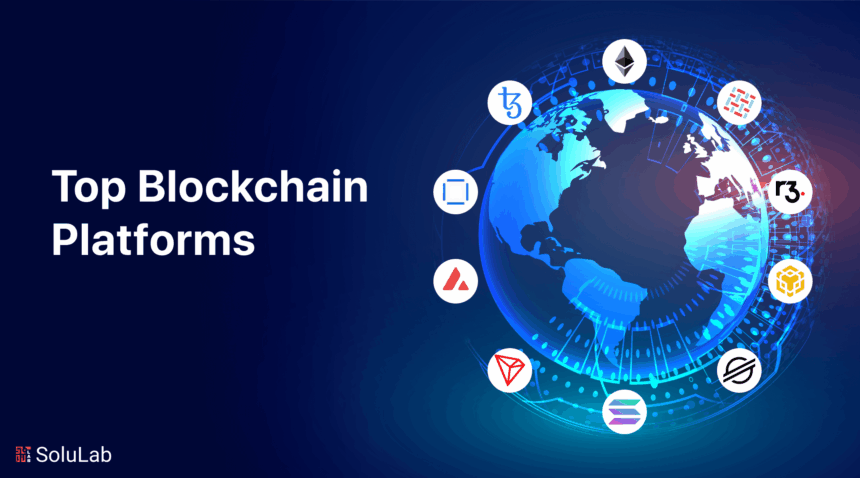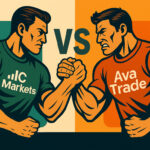This article focuses on the Best Blockchain Platforms for Business Application Development and their importance in the current digital transformation.
These platforms provide the environment for smart contracts, digital assets, and enterprise solutions which are secure, scalable, and transparent. With the proper selection of blockchain technology, businesses can improve various industries in efficiency, trust, compliance, and innovation.
What is Blockchain Platforms?
A blockchain platform is an intranet that users and developers can develop and use decentralized apps, smart contracts, and digital assets. It’s the tech framework on which blockchain networks run. It is the tech framework on which data is distributed, stored, secured and made transparent across multiple systems without a central controlling point.
Ethereum, Solana, and Binance Smart Chain provide the building blocks for cashless crypto transactions, decentralized finance, NFTs, and business products tailored for secure automated frameworks. These systems are trustless meaning the maker of the system does not have to be relied on.
How To Choose Blockchain Platforms for Business Application Development
Specify Business Needs
- Identify if the blockchain you need is public, private, or consortium
- Specify the intended function: Payments, supply chain, healthcare, NFTs, or securing data
- Identify applicable regulations, as well as data privacy needs
Support for Smart Contracts
- Assess if the platform has robust smart contract capabilities
- Look for platforms that offer prevalent languages (e.g., Solidity, Rust, Go)
- Make sure contract security and auditing capabilities are provided
Performance Metrics & Scalability
- Identify the number of transactions the platform processes in a given timeframe
- For enterprises, low latency and high throughput are must haves
- Ensure the platform can grow as users and demand increase
Consensus Mechanism & Security
- Go for consensus mechanisms that are robust, such as Proof of Stake (PoS) or BFT variants
- Seek platforms with a good history of cyber security
- Monitor how the network secures itself from attacks – a 51% attacks, for example
Key Point & Best Blockchain Platforms for Business Application Development List
| Blockchain Platform | Network Type | Smart Contract Support | Main Strength | Ideal Use Cases |
|---|---|---|---|---|
| Ethereum | Public | Yes (Solidity, Vyper) | Largest ecosystem & DeFi/NFT leader | Decentralized apps, DeFi, NFTs |
| Avalanche | Public | Yes (Solidity compatible) | Very fast transactions & multi-chain architecture | Web3 apps, DeFi, enterprise scaling |
| Polygon | Public (Layer-2 for Ethereum) | Yes (Solidity) | Low fees & high scalability | Scalable Ethereum applications, gaming |
| Solana | Public | Yes (Rust, C/C++) | High throughput & low fees | High-speed finance, gaming, payments |
| Algorand | Public | Yes (TEAL, Python SDK) | Pure PoS with strong security & low cost | Enterprise apps, tokenization, CBDCs |
| Stellar | Public | Limited smart contracts | Fast cross-border transactions | Payments, remittances, financial services |
| Tezos | Public | Yes (Michelson) | Self-amending governance & formal verification | Secure smart contracts, on-chain upgrades |
| Near Protocol | Public | Yes (Rust, JavaScript) | User-friendly and scalable sharding | Consumer apps, DeFi, gaming |
| Sui Network | Public | Yes (Move language) | High parallel processing for speed | Asset-centric apps, gaming, NFTs |
1. Ethereum
Ethereum stands out as one of the most effective blockchain platforms for the development of business applications for several reasons: its mature ecosystem, strong smart contract capabilities, and excellent developer support.
Its compatibility with the programming language Solidity and plethora of resources allow businesses to quickly develop and deploy decentralized applications for finance, supply chain, identity, and automation.
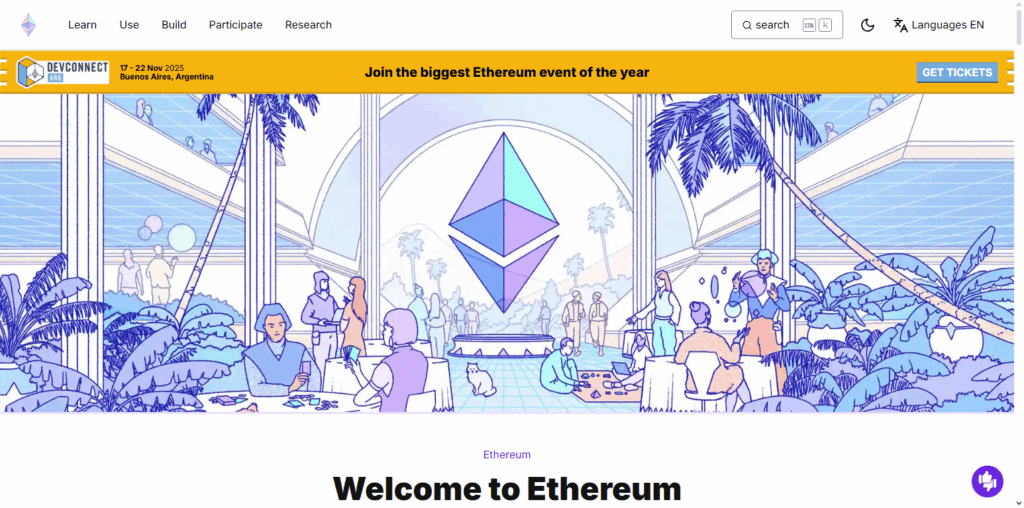
The vast Ethereum community enables continuous improvements, upgrades, and dependability. Businesses are no longer constrained by performance issues; Polygon and other Layer-2 solutions cut costs and increase scalability.
Businesses may develop transparent, automated, and innovative digital solutions that are secure, decentralized, and cutting-edge with Ethereum’s proven and uncompromising reliable infrastructure.
| Category | Important Details |
|---|---|
| Network Type | Public, decentralized blockchain |
| Smart Contracts | Yes — Solidity & Vyper programming |
| KYC Requirement | Not required at protocol level; depends on application |
| Main Advantage | Large ecosystem for DeFi, NFTs, and enterprise solutions |
| Scalability Options | Layer-2 networks like Polygon, Optimism, Arbitrum |
| Transaction Fees | Variable gas fees based on network activity |
| Security Level | Very high — Strong validator network under PoS |
| Enterprise Use Cases | Finance, supply chain data, identity management, automation |
| Developer Support | Extensive tools, documentation, and global community |
2. Avalanche
One of the best blockchain platforms for developing business applications is Avalanche, due to its high-speed performance, customizable architecture, and low operational costs.
The innovative consensus mechanism allows thousands of transactions to be completed while strong security for businesses is maintained, enabling enterprises to scale without running into congestion issues.
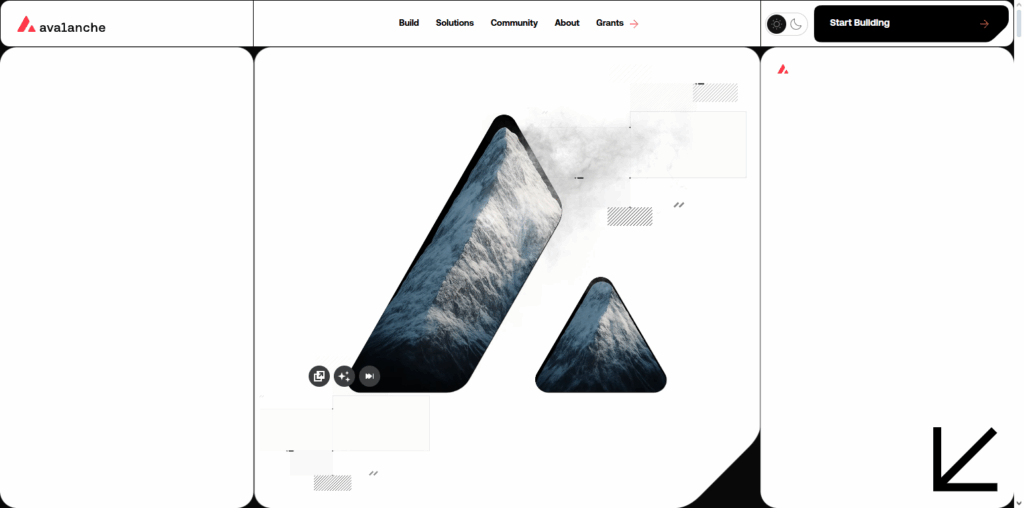
Avalanche allows the creation of custom blockchains, or subnets, which enables businesses to craft networks with their own rules, validators, and compliance requirements. Its Ethereum tool compatibility also gives ease in migration and development with Solidity.
With sustainability, fast finality, and flexibility at the forefront, Avalanche enables businesses to build efficient, scalable, and flexible digital solutions that meet industry regulations.
| Category | Important Details |
|---|---|
| Network Type | Public blockchain with multi-chain architecture (X-Chain, C-Chain, P-Chain) |
| Smart Contracts | Yes — EVM-compatible, supports Solidity |
| KYC Requirement | Not required at base protocol level; optional based on business application |
| Main Advantage | Very high speed and low fees with fast finality |
| Enterprise Feature | Customizable Subnets for compliance, governance, and private networks |
| Transaction Performance | Thousands of TPS with sub-second confirmation |
| Security Model | Avalanche consensus — strong security and decentralized validation |
| Business Use Cases | DeFi, tokenization, enterprise networks, high-frequency applications |
| Developer Ecosystem | Robust tools and eas |
3. Polygon
Polygon stands out as one of the finest blockchain platforms for developing business applications because of its ability to resolve Ethereum’s scalability issues while increasing transaction speeds, reducing costs, and maintaining security.
Enterprises can select the most appropriate environment for their applications because of the variety of scaling options—sidechains, zk-rollups, and Layer-2 networks. Businesses can easily build decentralized applications without altering their existing smart contracts because of the tools’ complete interoperability.
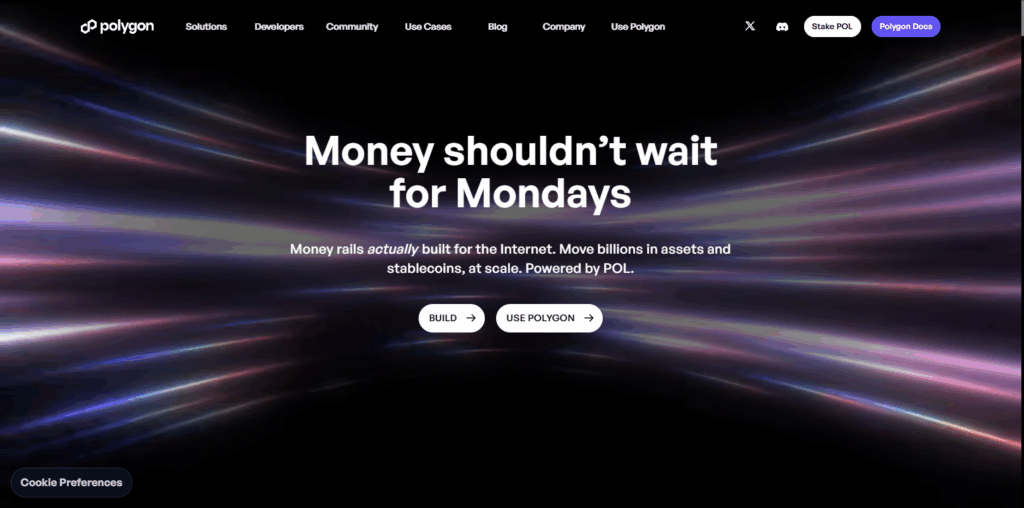
With a developing ecosystem focused on Web3 gaming, retail, DeFi, and enterprise integrations complemented by robust developer resources, enterprise customers can integrate confidently.
Polygon’s commitment to sustainability and simple onboarding processes gives businesses the ability to build blockchain applications that are economically efficient, scalable, and primed for future technological advances.
| Category | Important Details |
|---|---|
| Network Type | Layer-2 and multi-chain scaling solution for Ethereum |
| Smart Contracts | Yes — Solidity-based smart contracts |
| KYC Requirement | Not required at protocol level; depends on specific application |
| Main Advantage | Low transaction fees and fast scalability |
| Enterprise Focus | Supports large-scale dApps, Web3 gaming, and corporate integrations |
| Scalability Options | Sidechains, zk-rollups, optimistic rollups |
| Security | Secured by Ethereum with added scaling layers |
| Business Use Cases | Retail apps, gaming, DeFi, tokenized assets |
| Developer Support | Wide support with Ethereum tools and large community |
4. Solana
One of the top blockchain platforms for developing business applications is Solana, largely due to its swift transactions, low costs, and robust fundamentals. Thanks to its unique Proof of Stake and Proof of History hybrid architecture, Solana handles thousands of transactions each second.
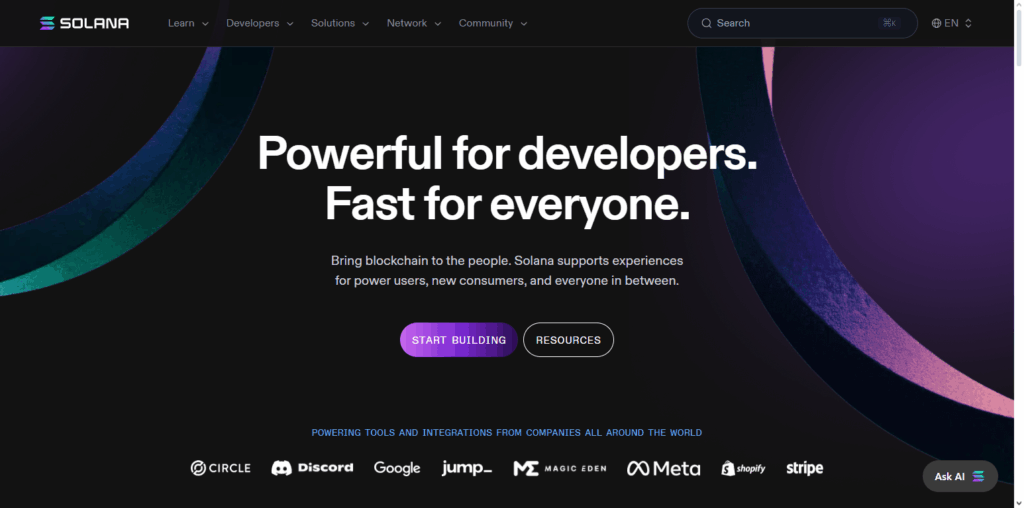
This is pivotal for real-time financial services, high-volume marketplaces, and sophisticated Web3 applications like gaming and tokenized assets. They also have the scalable infrastructure necessary for providing excellent user experiences during peak periods of activity.
With a growing developer community and strong Solana tooling, the network has also positioned itself to help enterprises build applications that are quick, cost effective and can be accessed from anywhere in the world.
| Category | Important Details |
|---|---|
| Network Type | Public, high-performance blockchain |
| Smart Contracts | Yes — Developed using Rust, C, C++ |
| KYC Requirement | No KYC required at protocol level; application-dependent |
| Main Advantage | Extremely fast transactions with low fees |
| Technical Innovation | Proof of History combined with Proof of Stake |
| Scalability | High throughput — suitable for real-time business apps |
| Security | Robust security with decentralized validators |
| Enterprise Use Cases | Fintech apps, marketplaces, gaming, payments |
| Developer Ecosystem | Growing tools, SDKs, and Web3 infrastructure |
5. Algorand
Algorand offers one of the most effective blockchain platforms for developing business applications because rapid security and high performance deficits are closed with its Pure Proof of Stake (PPoS) consensus. Importantly, design network centralization is prevented while guaranteeing finality.
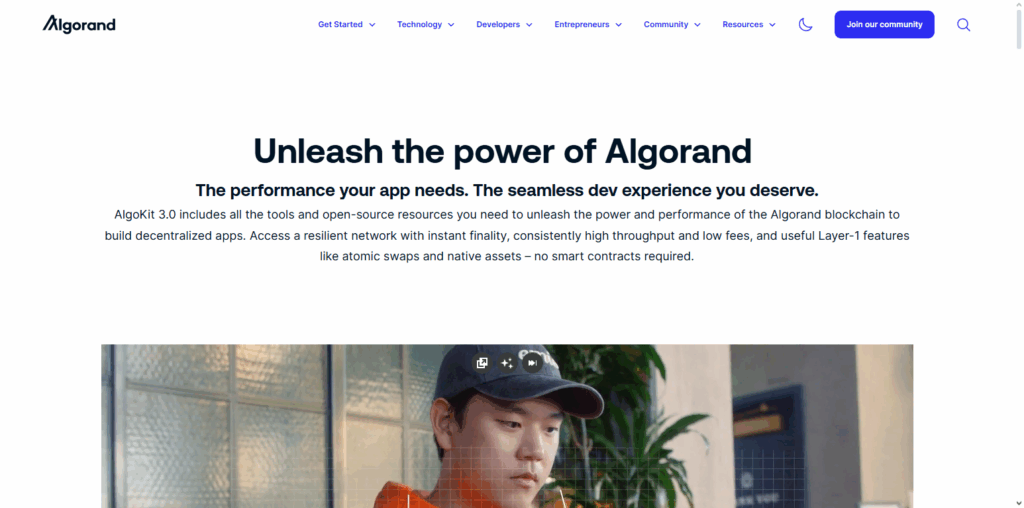
Algorand is capable of completing transactions in a matter of seconds and with no risk of rollback. Large-scale commercial applications favor Algorand’s asset tokenization, smart contract, decentralized finance, and low-ever changing fees over peer blockchain competitors.
For government-sponsored projects such as Central Bank Digital Currencies (CBDCs) and financial infrastructure, Algorand’s transparent governance and compliance features are highly flexible. Focusing on the build sustainable, reliable, and efficient blockchain; long-lasting solutions to enterprises supported by trust and Algorand will have most of their concerns.
| Category | Important Details |
|---|---|
| Network Type | Public blockchain with Pure Proof of Stake (PPoS) |
| Smart Contracts | Yes — TEAL and Python-based smart contract support |
| KYC Requirement | None at protocol level; optional for business applications |
| Main Advantage | Fast finality and consistently low transaction fees |
| Enterprise Focus | Strong support for tokenization and financial infrastructure |
| Scalability | High throughput suitable for growing business networks |
| Security | Highly secure due to randomized validator selection |
| Business Use Cases | CBDCs, digital assets, supply chain, payments |
| Developer Ecosystem | Reliable SDKs and enterprise collaboration tools |
6. Stellar
The Stellar blockchain platform excels in the area of business application development new technologies because it was designed specifically for low-cost, fast, and borderless transactions.
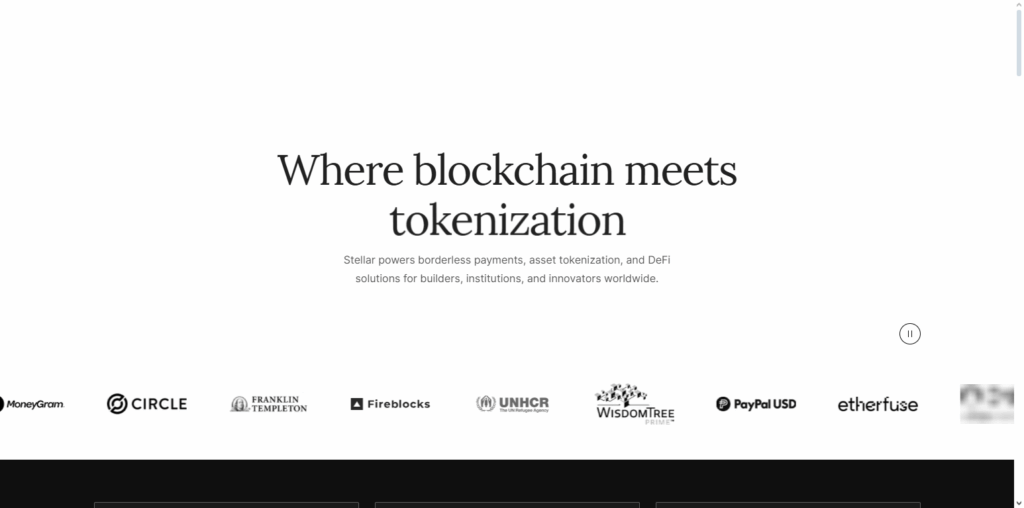
Stellar’s unique consensus avoids costly mining and enables near-instant settlement, making the blockchain a viable option for businesses and enterprises that concentrate on payments, remittances, and financial inclusion. Stellar permits businesses to issue digital assets and connect to the global financial system, while cross-border transfers and inter-country remittances are banked in predictable fees.
Stellar’s focus on interoperability and compliant with cross-border regulations tracks inter-country remittances on blockchain transfers, making it a robust bridge for traditional banking to blockchain networks. Stellar’s interoperability, financial inclusion, and bridging of traditional and blockchain networks offers a solid partnership for enterprises to expand globally.
| Category | Important Details |
|---|---|
| Network Type | Public blockchain focused on financial transactions |
| Smart Contracts | Limited; supports basic programmable logic |
| KYC Requirement | Not required by the network; businesses can add compliance if needed |
| Main Advantage | Fast, low-cost cross-border payments |
| Enterprise Focus | Integrates with financial institutions for global remittances |
| Scalability | High performance for transaction-heavy systems |
| Security | Stellar Consensus Protocol ensures efficient, secure validation |
| Business Use Cases | Payments, fintech apps, asset issuance |
| Developer Ecosystem | Stable tools for financial infrastructure development |
7. Tezos
One of the best platforms for developing business applications on the blockchain is Tezos. The reason for this is that Tezos promotes long term stability with on-chain governance and self-amendable architecture of the blockchain.
This flexibility makes it possible for the network to develop without disruptive forks, ensuring that a business is consistently working on an improving secure and safe environment.
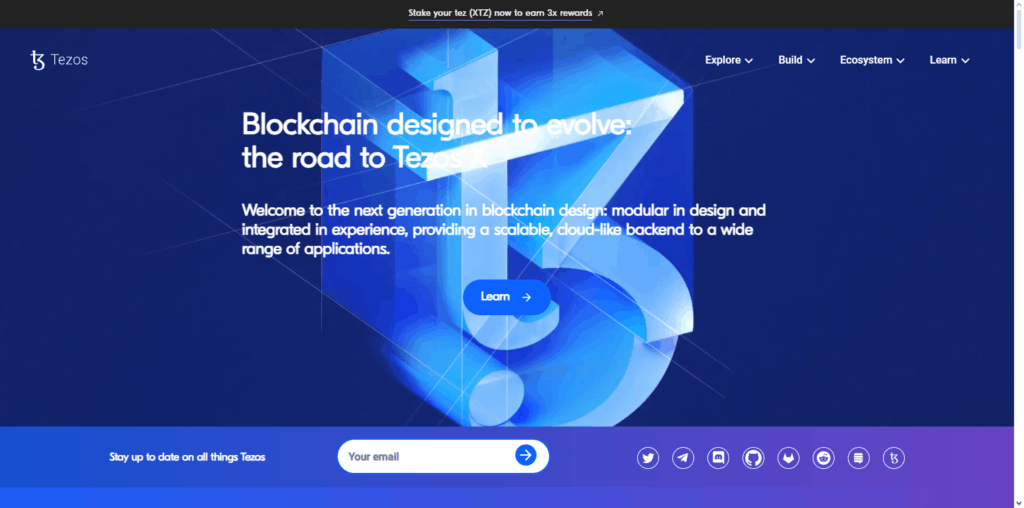
The Tezos blockchain performs low cost, eco friendly, and self-amendable smart contracts and allows enterprises to forensically validate the mathematical code which is essential for finance, insurance and high stake transactions.
The institutional use of Tezos and regulatory safe digital assets, tokenized real estate, applications of enterprise grade along with its adaptability makes Tezos a trustworthy environment for business innovation. Strong governance makes it a makes it futuristic.
| Category | Important Details |
|---|---|
| Network Type | Public blockchain with self-upgrading governance |
| Smart Contracts | Yes — Michelson, SmartPy (formal verification support) |
| KYC Requirement | None at protocol level; user apps can add KYC if needed |
| Main Advantage | On-chain upgrades without network forks for long-term stability |
| Enterprise Focus | High-security smart contracts for regulated sectors |
| Scalability | Efficient operations with energy-friendly PoS |
| Security | Formal verification ensures correctness and reduces vulnerabilities |
| Business Use Cases | Digital securities, tokenized assets, institutional finance |
| Developer Ecosystem | Strong backing and governance participation for innovation |
8. Near Protocol
Among all blockchain platforms, Near Protocol stands out when it comes to developing business applications because it prioritizes efficiency, ease of use, and high levels of performance thanks to its unique scalable sharding.
Such an architecture guarantees fast transactions at low and predictable costs no matter how much a business interacts with the network. Near facilitates the transition to Web3 for businesses because it allows the use of JavaScript and Rust to write smart contracts.
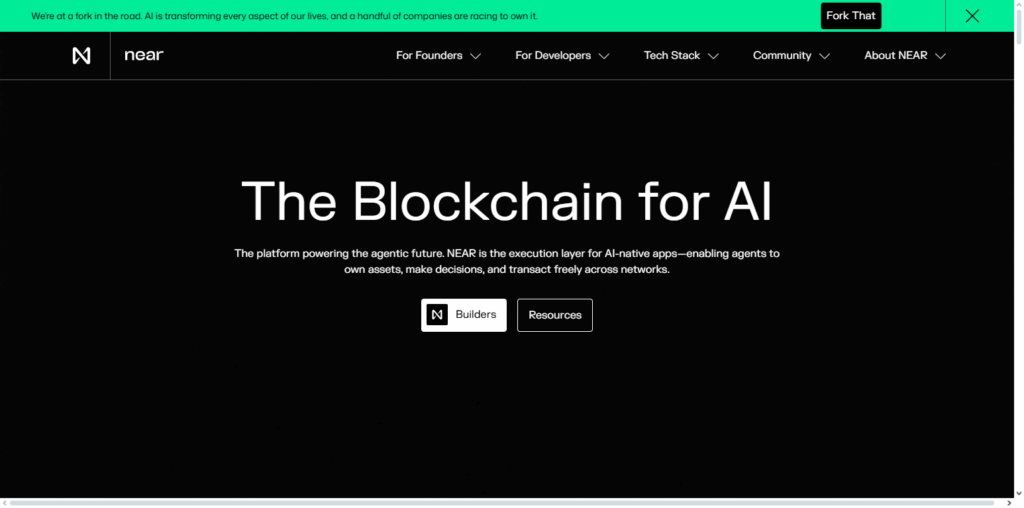
The friction for end users unfamiliar with decentralized wallets is removed by the flexible account model and the hassle-free onboarding mechanisms available at Near.
Near takes data privacy and eco-friendliness very seriously, allowing enterprises to build competitive applications with all the features mentioned above. Such applications are tailored for the end-user and designed to provide smooth and efficient digital services worldwide.
| Category | Important Details |
|---|---|
| Network Type | Public blockchain with scalable sharding architecture |
| Smart Contracts | Yes — Supports Rust and JavaScript |
| KYC Requirement | Not required by default; optional for specific business apps |
| Main Advantage | User-friendly onboarding and low, predictable fees |
| Enterprise Focus | Designed for consumer-facing Web3 and high-usage apps |
| Scalability | High throughput with optimized sharding for growing networks |
| Security | Decentralized PoS with strong security measures |
| Business Use Cases | DeFi, marketplaces, Web3 consumer apps |
| Developer Ecosystem | Rich tooling and simplified development experience |
9. Sui Network
Sui Network is among the most competitive blockchain platforms for business application development due to the introduction of highly efficient data structures optimized for rapid and flexible asset operations.
Developed in the Move programming language, Sui supports the secure and flexible development of smart contracts and prevents many common pitfalls.
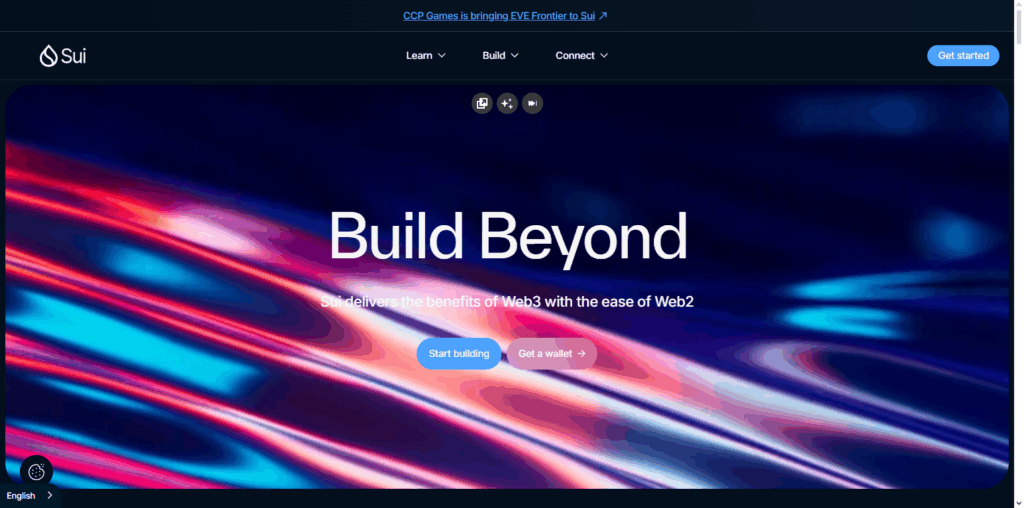
The ability to perform parallel transaction processing dramatically increases speed and scalability, particularly for latency-sensitive applications such as gaming, e-commerce, and digital asset marketplaces.
Sui’s architecture enables customizable and programmable user experiences by incorporating advanced on-chain ownership logic. Sui’s high performance combined with low transaction costs and ease of use for developers provides businesses with the necessary tools to confidently build innovative, high-volume Web3 solutions.
| Category | Important Details |
|---|---|
| Network Type | Public blockchain optimized for high-performance asset operations |
| Smart Contracts | Yes — Built using Move programming language |
| KYC Requirement | Not required at protocol level; can be implemented by applications |
| Main Advantage | Parallel transaction processing for real-time user experiences |
| Enterprise Focus | Asset-centric apps like gaming, e-commerce, marketplaces |
| Scalability | Very high throughput with low latency |
| Security | Strong protection against asset handling vulnerabilities |
| Business Use Cases | NFTs, digital commerce, high-interaction applications |
| Developer Ecosystem | Modern tooling designed for efficient Web3 development |
Conclusion
Your business application priorities around security, scalability, cost efficiency, and regulatory compliance will determine which blockchain platform is best suited for your needs. Ethereum, Solana, Avalanche, and Polygon support high-performance decentralized applications.
Algorand and Hyperledger Fabric focus on strong privacy and compliance for enterprise needs. Stellar, Tezos, Near Protocol, and Sui Network development also offer features that enhance applications for finance, governance, accessibility, and asset management.
Choosing a platform that aligns with industry needs and strategic goals allows innovation, increased trust in business processes, and blockchain-enabling the digital ecosystems of the future.
FAQ
Which blockchain platform is best for enterprise privacy?
Hyperledger Fabric is a leading choice because it supports permissioned networks, confidential data channels, and customizable access controls.
Why should businesses adopt blockchain platforms?
Blockchain improves data security, transparency, automation, and trust while minimizing fraud and intermediaries, making operations more efficient and reliable.
Can blockchain platforms integrate with existing business systems?
Yes. Many platforms like Ethereum, Near Protocol, and Hyperledger Fabric support APIs and tools for seamless system integration.


